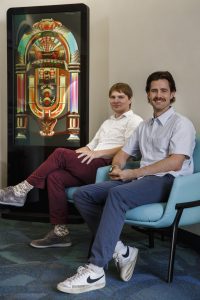LIVERMORE, Calif. - You've just put a dollar into a machine to play a song and it stopped playing after a few seconds. You put in another dollar and the tune stops after a minute. You can't get your dollars back and can't listen to the song you want. But what if you had known ahead of time what would happen, and could have saved yourself the money and frustration?
Much is still unknown about how quantum computers behave and what they might one day help humans achieve. But a team at Sandia National Laboratories has developed a process to understand how to use quantum systems more efficiently - using the analogy of a simple jukebox.

"We're building models that allow scientists to really understand a quantum computer so they can either make it better or understand what problems it can solve," Sandia computer scientist Daniel Hothem said.
Quantum computers have the potential to tackle complex problems faster and more accurately than the world's best supercomputers. They do so by using physical phenomena - like laser beams - to manipulate quantum bits of information, similar to how conventional computers use electricity to manipulate 0s and 1s.
But there is a major gap between what a "perfect" quantum computer is theoretically capable of and the performance of current systems because real-world devices experience physical errors that corrupt calculations. Closing that gap is essential if quantum computers are to deliver on their promise.
"Imagine typing into a document and Word just crashes," fellow computer scientist Timothy Proctor explained. "It quits a lot of the time, and you couldn't predict when that was going to happen. Or maybe the program types a different word than the one you typed, and the only way you'd know is by trying it."
A tool that could predict when and why a quantum computer fails by identifying what physical errors are likely to occur could help researchers avoid those mistakes and accelerate development of the next generation of computing. Daniel and Timothy believe they're building that tool.
"Imagine you're looking at an old jukebox," Daniel said. "You want to play a record, but you're worried it won't work - after all, it is old. The records may be scratched, the coin feed could be busted, or there might be a faulty wire. Before you spend a quarter, you'd like to know if your record will play the way you want it to. Since you don't own the jukebox, you can't just open it up to examine its parts."
In the team's models, a neural network processes a digital snapshot of a quantum program and predicts which physical errors will occur when it runs on a quantum computer. Those errors are then translated into a mathematical formula that predicts how often the program will succeed.
By training the models on data from successful and failed programs, the team doesn't have to rely heavily on quantum computers. The models learn by proxy.
The method could also help researchers outside of computing understand which problems existing quantum systems can realistically solve. For instance, a chemist might use the models to determine whether a quantum computer can successfully run simulations of chemical systems.
As the Sandia team continues refining their models, the potential benefits for quantum computing are significant. By better modeling real-world errors, the team hopes to reduce the time and cost of developing the next generation of quantum systems.
"One of our goals is to help scientists cut down on non-fruitful research directions," Daniel said, emphasizing how their work could streamline research and accelerate the ways scientists can use quantum computers to tackle the world's toughest national security challenges.






